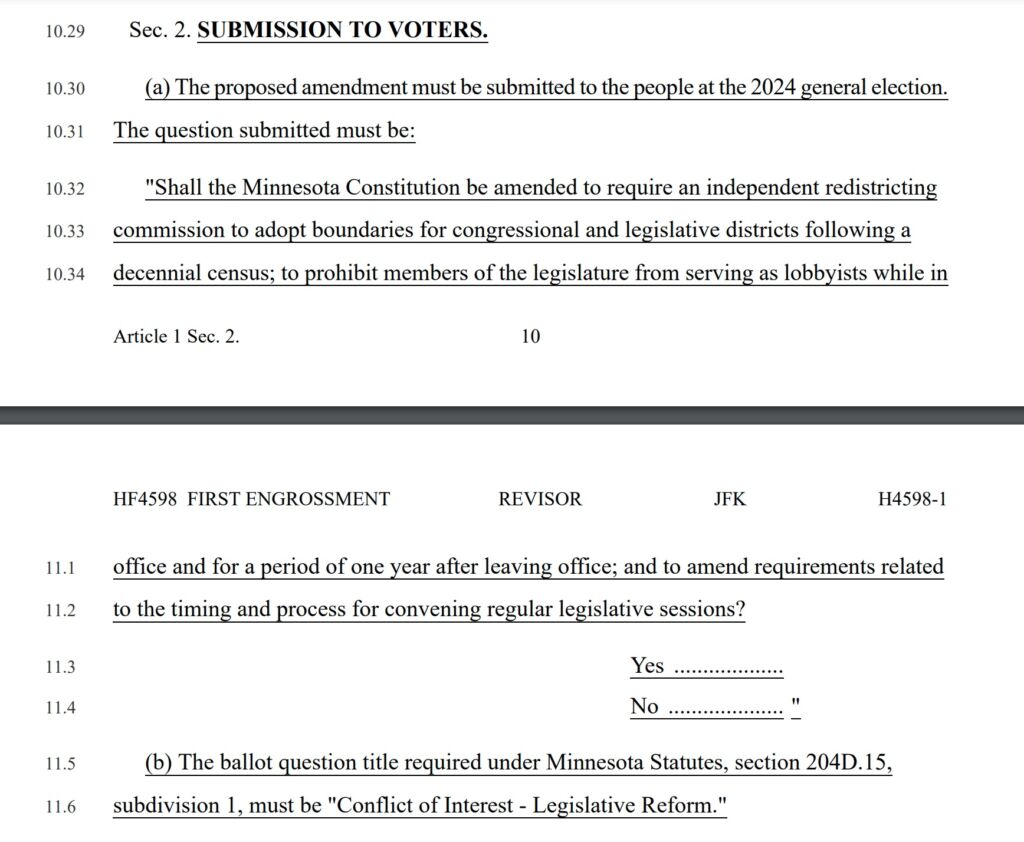Capitol Watch: Year-round legislature?
They built themselves a palace, might as well work year-round
In 2016, the Minnesota legislature put a constitutional amendment on the ballot claiming it would limit the ability to raise their own pay. Here is the language put to voters in the 2016 election:
Shall the Minnesota Constitution be amended to remove state lawmakers’ power to set their own salaries, and instead establish an independent, citizens-only council to prescribe salaries of lawmakers?
Limit the power of the legislature? Sounds great! The misleading and disingenuous amendment passed overwhelmingly. A citizen commission took over control of legislative salaries and have since raised them from $31,000 to $51,750 in less than ten years. This was the exact outcome expected (and desired) by money-hungry legislators as they amended the constitution to “limit power” and raise their pay.
House File 4598 appears to be another wolf in sheep’s clothing constitutional amendment introduced by House Democratic leaders in the 2024 session. The proposed amendment would be titled “Conflict of Interest – Legislative Reform,” and deals with three issues, leading with the most popular, a citizen redistricting commission. Sound familiar? The second issue bans legislators from being lobbyists for a full year after they leave the legislature. Heck ya! Who doesn’t hate the revolving door of legislator/lobbyists? And then comes the third issue: “to amend requirements related to the timing and process for convening regular legislative sessions.” Sounds innocuous, but what does it mean?
If Minnesota voters take the time to get past the redistricting commission and ban on lobbying, they will discover that the third issue in the amendment changes the legislature from part-time to full-time. The timing of the legislative session is currently limited by the constitution to no more than 120 days every two years and no session can last past the first Monday following the third Saturday in May. Eliminating this language from the constitution would allow the legislature to meet year-round. Once convened, they would never go home.
Imagine the damage they would inflict on our freedoms and our pocketbooks if they met all year, rarely returning home to face taxpayers in the grocery store. St. Paul would look and act more like Washington, D.C. with a full-time legislature.
This proposal follows last year’s action by House leaders to subvert the normal borrowing process and build themselves a $729 million new state office building, winner of last year’s Golden Turkey spending award. And of course, the new citizen commission on salaries would immediately have to increase pay once the legislature becomes full-time.

Don’t be fooled by a citizen redistricting commission
Redistricting is the process used to determine legislative boundaries after the decennial census, and in many states, has become highly political. But not in Minnesota. With one unusual exception, a non-partisan court panel has drawn the maps used for selecting representatives to Congress and the Minnesota legislature for the last 50 years. That’s because Minnesota has experienced divided government for most of that time, meaning no one political party was able to pass a partisan map favoring their candidates. Once the legislature stalemates on redistricting, the courts take over and draw maps in time for the next election.
The one exception was the 1990 process when House and Senate Democrats passed a very partisan map expecting Republican Governor Arne Carlson’s veto. But Carlson’s veto was not returned to the Senate in time to meet the statutory deadline and the DFL plan became law. Looking back, it’s amazing that House Republicans were able to win the majority in 1998 with the DFL’s dream map. In fact, once the boundaries were changed in 2002 (by an impartial court), Republicans swelled their majority to 81 seats.
With Republicans on the wrong side of a ruling trifecta right now, they might be tempted by a “non-partisan” redistricting commission. But the experience of other states should serve as a warning not to let another citizen commission take over a power specifically given to the legislature.
The big question in non-partisan commissions is, who is the appointing authority? The proposed amendment in HF 4598 goes to ridiculous lengths to create a process that will be perceived to be fair. It starts with two retired judges, one from each party, appointed by the chief justice of the state supreme court. (Remind me again who appointed the chief justice?) Those judges get together and choose a third judge who has no political affiliation. A judge with no political affiliation in the state of Minnesota? Good luck filling that role. The three judges are then asked to find 90 Minnesotans eager to serve on this commission from which they will select 15 members. Oh, and the 90 candidates can’t have any connection to politics, government or lobbying. Somehow they end up with a citizen commission with five Democrats, five Republicans and five citizens with no party affiliation.
In every other state this has been tried, the non-partisan members of the commission have leaned Democratic and produced a map detrimental to Republican interests. Minnesotans can look to the current Campaign Finance Board to get an idea of how this would play out here. Republican members of this board always end up being squishy, moderate former legislators all too eager to show how fair they can be. Democratic members are strong Democrats eager to stick it to Republicans. Non-partisans in Minnesota always lean more to the left than the right, and the same thing will happen with a redistricting commission.
HF 4598 is an attempt to create a full-time legislature by confusing voters with popular sounding constitutional changes. We learned our lesson with the pay raise amendment in 2016. This bill should be defeated before it reaches the voters.
This post was originally sent to subscribers of the Capitol Watch email. To subscribe and see this content first throughout the legislative session, click here.